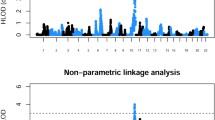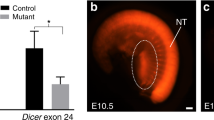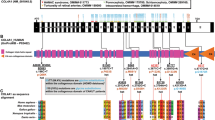Abstract
Vesicoureteric reflux (VUR) is a congenital urinary tract defect caused by abnormal insertion of the ureter within the bladder wall. This leads to a defective ureterovesical junction in which urine flows retrogradely from the bladder to the kidneys. Although VUR is associated with recurrent urinary tract infections, renal malformations, hypertension, and reflux nephropathy, its relationship to each of these clinical entities is poorly understood. Mutations in genes expressed by the developing kidney and urinary tract can cause VUR in mice, and some of these same genes have been identified in humans with VUR. By discovering the genes that are associated with VUR, new hypotheses will be generated such that, eventually, the relationship between VUR and its complications will be understood.


Similar content being viewed by others
References
Chapman CJ, Bailey RR, Janus ED, Abbott GD, Lynn KL (1985) Vesicoureteric reflux: segregation analysis. Am J Med Genet 20(4):577–584
Risdon RA, Yeung CK, Ransley PG (1993) Reflux nephropathy in children submitted to unilateral nephrectomy: a clinicopathological study. Clin Nephrol 40(6):308–314
NAPRTCS Annual Report (2006) https://doi.org/web.emmes.com/study/ped/annlrept/annlrept2006.pdf. Accessed on September 19, 2007
Batourina E, Choi C, Paragas N, Bello N, Hensle T, Costantini FD, Schuchardt A, Bacallao RL, Mendelsohn CL (2002) Distal ureter morphogenesis depends on epithelial cell remodeling mediated by vitamin A and Ret. Nat Genet 32(1):109–115
Viana R, Batourina E, Huang H, Dressler GR, Kobayashi A, Behringer RR, Shapiro E, Hensle T, Lambert S, Mendelsohn C (2007) The development of the bladder trigone, the center of the anti-reflux mechanism. Development 134(20):3763–3769
Mackie GG, Stephens FD (1975) Duplex kidneys: a correlation of renal dysplasia with position of the ureteral orifice. J Urol 114(2):274–280
Yu OH, Murawski IJ, Myburgh DB, Gupta IR (2004) Overexpression of RET leads to vesicoureteric reflux in mice. Am J Physiol Renal Physiol 287(6):F1123–F1130
Murawski IJ, Myburgh DB, Favor J, Gupta IR (2007) Vesico-ureteric reflux and urinary tract development in the Pax21Neu+/- mouse. Am J Physiol Renal Physiol 293(5):F1736–F1745
Vermillion CD, Heale WF (1973) Position and configuration of the ureteral orifice and its relationship to renal scarring in adults. J Urol 109(4):579–584
Gruber CM (1929) A comparative study of the intra-vesical ureters (uretero-vesical valves) in man and in experimental animals. J Urol 21(5):567–581
Paquin AJ Jr (1959) Ureterovesical anastomosis: the description and evaluation of a technique. J Urol 82:573–583
Hutch JA (1961) Theory of maturation of the intravesical ureter. J Urol 86:534–538
Burger RH (1972) A theory on the nature of transmission of congenital vesicoureteral reflux. J Urol 108(2):249–254
Pasch A, Hoefele J, Grimminger H, Hacker HW, Hildebrandt F (2004) Multiple urinary tract malformations with likely recessive inheritance in a large Somalian kindred. Nephrol Dial Transplant 19(12):3172–3175
Middleton GW, Howards SS, Gillenwater JY (1975) Sex-linked familial reflux. J Urol 114(1):36–39
Craig JC, Irwig LM, Knight JF, Roy LP (2000) Does treatment of vesicoureteric reflux in childhood prevent end-stage renal disease attributable to reflux nephropathy? Pediatrics 105(6):1236–1241
Murawski IJ, Gupta IR (2006) Vesicoureteric reflux and renal malformations: a developmental problem. Clin Genet 69(2):105–117
Goodfriend TL, Elliott ME, Catt KJ (1996) Angiotensin receptors and their antagonists. N Engl J Med 334(25):1649–1654
Oshima K, Miyazaki Y, Brock JW 3rd, Adams MC, Ichikawa I, Pope JC 4th (2001) Angiotensin type II receptor expression and ureteral budding. J Urol 166(5):1848–1852
Nishimura H, Yerkes E, Hohenfellner K, Miyazaki Y, Ma J, Hunley TE, Yoshida H, Ichiki T, Threadgill D, Phillips JA 3rd, Hogan BM, Fogo A, Brock JW 3rd, Inagami T, Ichikawa I (1999) Role of the angiotensin type 2 receptor gene in congenital anomalies of the kidney and urinary tract, CAKUT, of mice and men. Mol Cell 3(1):1–10
Siomou E, Papadopoulou F, Kollios KD, Photopoulos A, Evagelidou E, Androulakakis P, Siamopoulou A (2006) Duplex collecting system diagnosed during the first 6 years of life after a first urinary tract infection: a study of 63 children. J Urol 175(2):678–681; discussion 681–682
Srinivas S, Wu Z, Chen CM, D'Agati V, Costantini F (1999) Dominant effects of RET receptor misexpression and ligand-independent RET signaling on ureteric bud development. Development 126(7):1375–1386
Pedersen A, Skjong C, Shawlot W (2005) Lim 1 is required for nephric duct extension and ureteric bud morphogenesis. Dev Biol 288(2):571–581
Sanyanusin P, Schimmenti LA, McNoe LA, Ward TA, Pierpont ME, Sullivan MJ, Dobyns WB, Eccles MR (1995) Mutation of the PAX2 gene in a family with optic nerve colobomas, renal anomalies and vesicoureteral reflux. Nat Genet 9(4):358–364
Kong XT, Deng FM, Hu P, Liang FX, Zhou G, Auerbach AB, Genieser N, Nelson PK, Robbins ES, Shapiro E, Kachar B, Sun TT (2004) Roles of uroplakins in plaque formation, umbrella cell enlargement, and urinary tract diseases. J Cell Biol 167(6):1195–1204
Bush KT, Vaughn DA, Li X, Rosenfeld MG, Rose DW, Mendoza SA, Nigam SK (2006) Development and differentiation of the ureteric bud into the ureter in the absence of a kidney collecting system. Dev Biol 298(2):571–584
Hu P, Deng FM, Liang FX, Hu CM, Auerbach AB, Shapiro E, Wu XR, Kachar B, Sun TT (2000) Ablation of uroplakin III gene results in small urothelial plaques, urothelial leakage, and vesicoureteral reflux. J Cell Biol 151(5):961–972
Shehata R (1977) A comparative study of the urinary bladder and the intramural portion of the ureter. Acta Anat (Basel) 98(4):380–395
Ohtomo Y, Nagaoka R, Kaneko K, Fukuda Y, Miyano T, Yamashiro Y (2001) Angiotensin converting enzyme gene polymorphism in primary vesicoureteral reflux. Pediatr Nephrol 16(8):648–652
Rigoli L, Chimenz R, di Bella C, Cavallaro E, Caruso R, Briuglia S, Fede C, Salpietro CD (2004) Angiotensin-converting enzyme and angiotensin type 2 receptor gene genotype distributions in Italian children with congenital uropathies. Pediatr Res 56(6):988–993
Lore F, Talidis F, Di Cairano G, Renieri A (2001) Multiple endocrine neoplasia type 2 syndromes may be associated with renal malformations. J Intern Med 250(1):37–42
Yang Y, Letendre J, Houle A, Richter A (2006) Gly691Ser mutation of Ret tyrosine kinase is associated with primary vesicoureteral reflux in the French-Canadian population in Quebec. 11th International Congress of Human Genetics PS01b. Available at www.ichg2006.com/abstract/160.htm
Jenkins D, Bitner-Glindzicz M, Malcolm S, Hu CC, Allison J, Winyard PJ, Gullett AM, Thomas DF, Belk RA, Feather SA, Sun TT, Woolf AS (2005) De novo uroplakin 111a heterozygous mutations cause renal adysplasia leading to severe kidney failure. J Am Soc Nephrol 16(7):2141–2149
Jenkins D, Bitner-Glindzicz M, Malcolm S, Allison J, de Bruyn R, Flanagan S, Thomas DF, Belk RA, Feather SA, Bingham C, Southgate J, Woolf AS (2006) Mutation analyses of Uroplakin II in children with renal tract malformations. Nephrol Dial Transplant 21(12):3415–3421
Yoneda A, Cascio S, Green A, Barton D, Puri P (2002) Angiotensin II type 2 receptor gene is not responsible for familial vesicoureteral reflux. J Urol 168(3):1138–1141
Kelly H, Ennis S, Yoneda A, Bermingham C, Shields DC, Molony C, Green AJ, Puri P, Barton DE (2005) Uroplakin III is not a major candidate gene for primary vesicoureteral reflux. Eur J Hum Genet 13(4):500–502
Shefelbine SE, Khorana S, Schultz PN, Huang E, Thobe N, Hu ZJ, Fox GM, Jing S, Cote GJ, Gagel RF (1998) Mutational analysis of the GDNF/RET-GDNFR alpha signaling complex in a kindred with vesicoureteral reflux. Hum Genet 102(4):474–478
Torres VE, Moore SB, Kurtz SB, Offord KP, Kelalis PP (1980) In search of marker for genetic susceptibility to reflux nephropathy. Clin Nephrol 14(5):217–222
Konda R, Sato H, Sakai K, Abe Y, Fujioka T (2004) Urinary excretion of vascular endothelial growth factor is increased in children with reflux nephropathy. Nephron Clin Pract 98(3):c73–c78
Yamamoto T, Noble NA, Miller DE, Border WA (1994) Sustained expression of TGF-beta 1 underlies development of progressive kidney fibrosis. Kidney Int 45(3):916–927
Yim HE, Bae IS, Yoo KH, Hong YS, Lee JW (2007) Genetic control of VEGF and TGF-beta1 gene polymorphisms in childhood urinary tract infection and vesicoureteral reflux. Pediatr Res 62(2):183–187
Anderson NG, Abbott GD, Mogridge N, Allan RB, Maling TM, Wells JE (1997) Vesicoureteric reflux in the newborn: relationship to fetal renal pelvic diameter. Pediatr Nephrol 11(5):610–616
Ogata T, Muroya K, Sasagawa I, Kosho T, Wakui K, Sakazume S, Ito K, Matsuo N, Ohashi H, Nagai T (2000) Genetic evidence for a novel gene(s) involved in urogenital development on 10q26. Kidney Int 58(6):2281–2290
Devriendt K, Swillen A, Fryns JP, Proesmans W, Gewillig M (1996) Renal and urological tract malformations caused by a 22q11 deletion. J Med Genet 33(4):349
Vats KR, Ishwad C, Singla I, Vats A, Ferrell R, Ellis D, Moritz M, Surti U, Jayakar P, Frederick DR, Vats AN (2006) A locus for renal malformations including vesico-ureteric reflux on chromosome 13q33-34. J Am Soc Nephrol 17(4):1158–1167
Lu W, van Eerde AM, Fan X, Quintero-Rivera F, Kulkarni S, Ferguson H, Kim HG, Fan Y, Xi Q, Li QG, Sanlaville D, Andrews W, Sundaresan V, Bi W, Yan J, Giltay JC, Wijmenga C, de Jong TP, Feather SA, Woolf AS, Rao Y, Lupski JR, Eccles MR, Quade BJ, Gusella JF, Morton CC, Maas RL (2007) Disruption of ROBO2 is associated with urinary tract anomalies and confers risk of vesicoureteral reflux. Am J Hum Genet 80(4):616–632
Grieshammer U, Le M, Plump AS, Wang F, Tessier-Lavigne M, Martin GR (2004) SLIT2-mediated ROBO2 signaling restricts kidney induction to a single site. Dev Cell 6(5):709–717
Ruf RG, Xu PX, Silvius D, Otto EA, Beekmann F, Muerb UT, Kumar S, Neuhaus TJ, Kemper MJ, Raymond RM Jr, Brophy PD, Berkman J, Gattas M, Hyland V, Ruf EM, Schwartz C, Chang EH, Smith RJ, Stratakis CA, Weil D, Petit C, Hildebrandt F (2004) SIX1 mutations cause branchio-oto-renal syndrome by disruption of EYA1-SIX1-DNA complexes. Proc Natl Acad Sci USA 101(21):8090–8095
Heimler A, Lieber E (1986) Branchio-oto-renal syndrome: reduced penetrance and variable expressivity in four generations of a large kindred. Am J Med Genet 25(1):15–27
Engels S, Kohlhase J, McGaughran J (2000) A SALL1 mutation causes a branchio-oto-renal syndrome-like phenotype. J Med Genet 37(6):458–460
Grote D, Souabni A, Busslinger M, Bouchard M (2006) Pax 2/8-regulated Gata 3 expression is necessary for morphogenesis and guidance of the nephric duct in the developing kidney. Development 133(1):53–61
Murer L, Benetti E, Artifoni L (2007) Embryology and genetics of primary vesico-ureteric reflux and associated renal dysplasia. Pediatr Nephrol 22(6):788–797
Feather SA, Malcolm S, Woolf AS, Wright V, Blaydon D, Reid CJ, Flinter FA, Proesmans W, Devriendt K, Carter J, Warwicker P, Goodship TH, Goodship JA (2000) Primary, nonsyndromic vesicoureteric reflux and its nephropathy is genetically heterogeneous, with a locus on chromosome 1. Am J Hum Genet 66(4):1420–1425
Sanna-Cherchi S, Reese A, Hensle T, Caridi G, Izzi C, Kim YY, Konka A, Murer L, Scolari F, Ravazzolo R, Ghiggeri GM, Gharavi AG (2005) Familial Vesicoureteral Reflux: Testing Replication of Linkage in Seven New Multigenerational Kindreds. J Am Soc Nephrol 16:1781–1787
van Eerde AM, Koeleman BP, van de Kamp JM, de Jong TP, Wijmenga C, Giltay JC (2007) Linkage study of 14 candidate genes and loci in four large Dutch families with vesico-ureteral reflux. Pediatr Nephrol 22(8):1129–1133
Conte ML, Bertoli-Avella AM, de Graaf BM, Lama G, La Manna A, Rambaldi PF, Oostra BA, Perrotta S (2006) A novel locus for primary familial vesicoureteral reflux maps to chromosome 3q. Eur J Hum Genet 14(Suppl 1):335
Kelly H, Molony CM, Darlow JM, Pirker ME, Yoneda A, Green AJ, Puri P, Barton DE (2007) A genome-wide scan for genes involved in primary vesicoureteric reflux. J Med Genet 44(11):710–717
Acknowledgements
We thank D.B. Myburgh for help with figure design and A.K. Ryan for comments and discussion on the manuscript. IRG is a recipient of an FRSQ Chercheur-Boursier Clinicien salary award. IJM is a recipient of an FRSQ doctoral award. This work is supported by an operating grant from the Kidney Foundation of Canada (IRG).
Author information
Authors and Affiliations
Corresponding author
Rights and permissions
About this article
Cite this article
Murawski, I.J., Gupta, I.R. Gene discovery and vesicoureteric reflux. Pediatr Nephrol 23, 1021–1027 (2008). https://doi.org/10.1007/s00467-007-0704-y
Received:
Revised:
Accepted:
Published:
Issue Date:
DOI: https://doi.org/10.1007/s00467-007-0704-y




